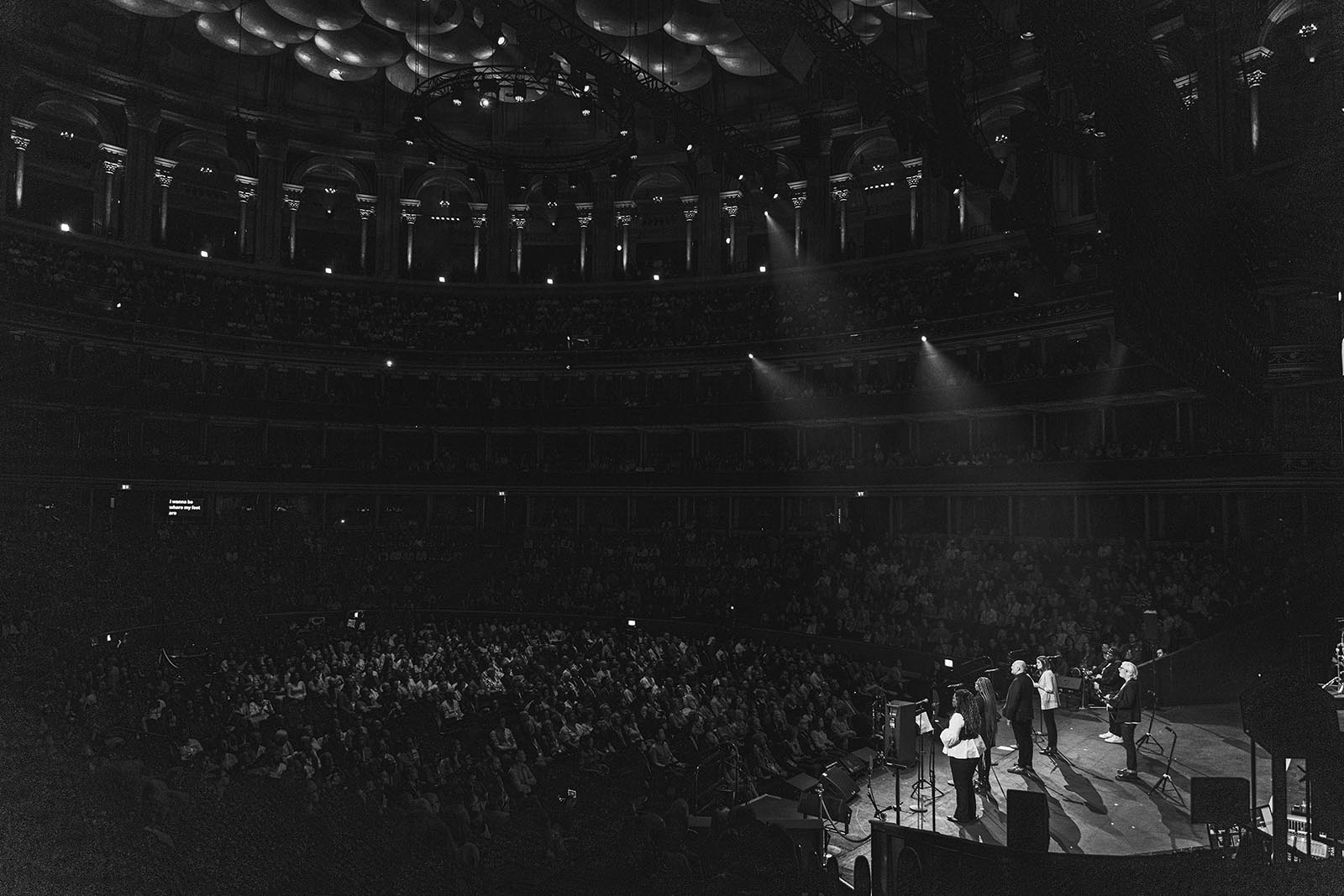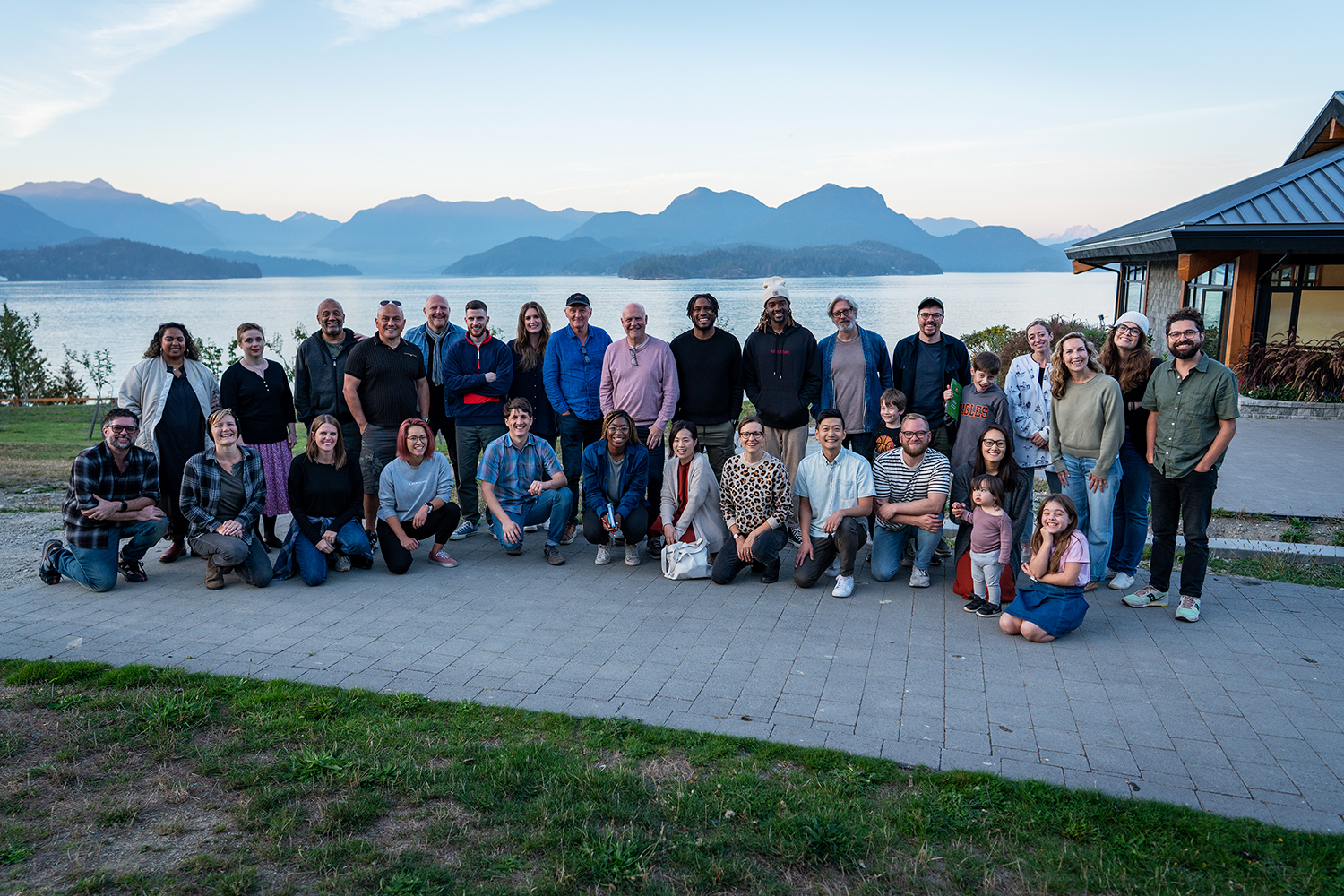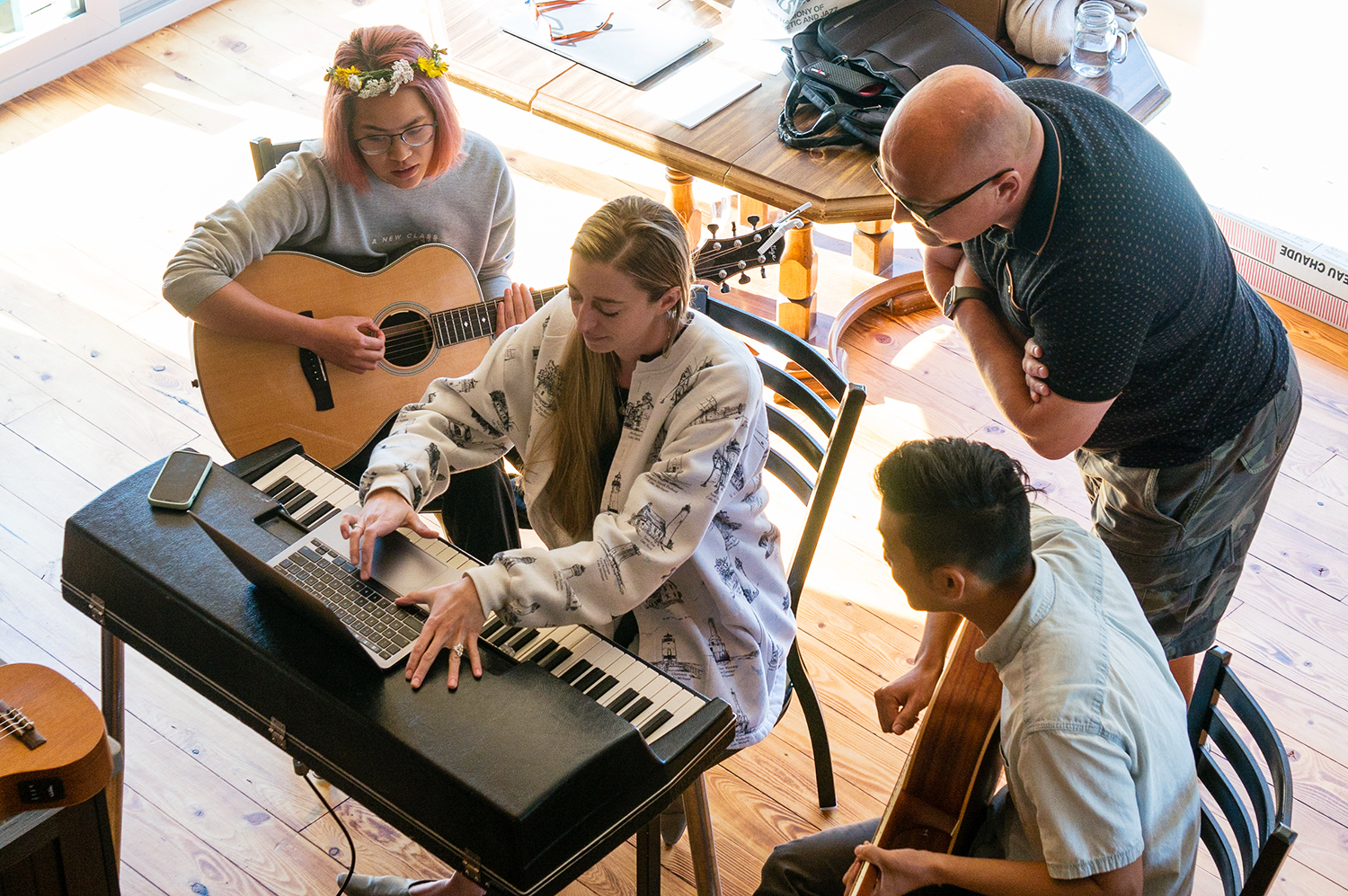
The Porter’s Gate performs at Royal Albert Hall in May 2023, in London. Photo courtesy of Daniel Whitehead
(RNS) — A wave of energy and emotion coursed through the 5,000-person crowd in London’s Royal Albert Hall in early May as the band onstage debuted its latest album.
Surrounded by the Victorian era architecture, the audience stood for The Porter’s Gate, a self-described “worship project” founded in 2017 by longtime worship leader Isaac Wardell and his wife, Megan. Though the songs were new to the audience, many sang along and were visibly moved.
“It was a really holy, almost out of body experience to see the songs impacting people,” said Daniel Whitehead, CEO of Sanctuary Mental Health Ministries and one of the collaborators on the album.
Though worshipful, the songs weren’t about flying away to glory or leaving the pain of this world behind. Instead, they aimed to make space for those feeling hopeless and abandoned, while reminding listeners that God is present in the here and now.
“As we were singing these songs, I was aware of my own grief, and my own faith at the same time, and the consolation of God,” recalled Canadian Christian artist Matt Maher, one of the musicians onstage. “It felt integrated in the best way. “

An album-writing retreat brought nearly 50 people, not all pictured, to an island off the coast of Vancouver, Canada, to collaborate and write the 12-track album “Sanctuary Songs.” Photo courtesy of The Porter’s Gate
“Sanctuary Songs,” a 12-track album inspired by conversations about mental health and faith and released on Friday (Sept. 15), is another timely and topic-driven album from The Porter’s Gate that follows earlier projects on climate justice, lament and vocation. It was birthed in partnership with Sanctuary at a five-day retreat in fall 2022 where a group of roughly 20 Sanctuary staff and 30 songwriters — including Jon Guerra, Doe Jones and Andrew Peterson — gathered on an island off the coast of Vancouver, Canada, to craft the album.
Many of the musicians, who represented a range of theological and cultural backgrounds, had personal connections to the topic.
“In that particular year, when Isaac asked me about this retreat, I had been struggling a lot with anxiety, I think like most people during the pandemic. And for the first time I came to an awareness of the physical symptoms of anxiety,” Maher told Religion News Service. “I realized I experienced them all for a long time. I just didn’t have the right language.”
Before arriving at the retreat center, artists were asked to complete The Sanctuary Course, an eight-session film-based series with discussion guides available for free on the Sanctuary website. The flagship ecumenical tool, which has been out since 2018, builds what Whitehead described as a “doctrine” of faith and mental health that defines terms and outlines the church’s role in addressing mental health. It’s since been used in 80 countries.

Niki Jung, from left, Valerie Guerra, Daniel Whitehead and Paul Lee huddle around a keyboard during a day of the retreat. Sanctuary Mental Health Ministries staff members joined with songwriters to spend five days collaborating and creating the album “Sanctuary Songs.” Photo courtesy of The Porter’s Gate
“The Sanctuary course brings these two worlds together and helps people to see that you shouldn’t have to leave your diagnoses or mental health challenges at the door when you come to church, nor should you have to leave your faith at the door when you enter a therapist’s office,” Whitehead explained.
At the retreat center, they discussed the course and were led through what Wardell described as “group therapy” for three days by psychologist Hillary McBride. The musicians and staff members took part in breathing exercises and meditation, dwelling on the psalms and focusing on being aware of their bodies in the present. One song on the album, “Centering Prayer,” was musicians Brian Eichelberger, Nick Chambers and Kate Bluett’s attempt at putting that meditation experience to music.
“I wanna be where my feet are,” the refrain repeats rhythmically. “I wanna breathe the life around me.”

Matt Maher plays guitar and sings during the retreat in western Canada. Photo courtesy of The Porter’s Gate
Wardell also teamed up with theologian John Swinton, who chairs the divinity and religious studies department at the University of Aberdeen in Aberdeen, Scotland, to lead a workshop. They discussed “Christ of the Abyss,” a bronze statue of Jesus reaching out, arms extended, that is submerged in the Mediterranean Sea.
“The only way for a person to experience it is you have to swim down, down, all the way to the bottom … and as you go down there underneath all the weight of the ocean, you find Jesus looking up to you,” said Wardell. “Can we imagine a world in which church is a place that helps us not just to go up to the hill of the Lord to find Jesus, but actually church being the place that helps us to go down to the depths to find Jesus?”
The workshop inspired Maher to write the anthem “Christ Is Lower Still,” the first track on the album. Maher told RNS the song is about a savior who doesn’t leave his humanity at the grave, but who intimately understands the reality of human suffering, even in his risen form: “He rose from the grave body, mind and spirit, and never took the scars off his hands.”
Wardell told RNS that the musicians collectively wrote around 100 songs, in full or in part, inspired by the retreat. Then, in the weeks after, the musicians continued to collaborate with the mental health experts at Sanctuary to polish lyrics and narrow down the final song selections for the album. The experts functioned as a theological sounding board, pointing out songs and phrases that might not be empowering for someone experiencing a mental health crisis.
The resulting 12 songs are general enough that one might not assume they are about mental health without the added context. But that design was intentional. Each song could fit easily into a church service, while “subversively” integrating conversations about mental health into worship, according to Wardell. The album is also meant as a compendium to The Sanctuary Course, a soundtrack that might lend emotional weight to the discussions.
Regardless of where it’s played, the album repeats a resounding message on nearly every track: God’s love is unconditional, and God is present even in suffering. And that’s a message Whitehead says the church — with its impulse to outsource mental health support or to tie up every testimony with a tidy, triumphant bow — desperately needs.

Attendees of the writing retreat sit on the porch one evening in western Canada during the group’s trip to write the new album “Sanctuary Songs.” Photo courtesy of The Porter’s Gate
“That initial response that you give to someone can dictate whether they can recover well in the church, or whether they feel like: I need to bury this stuff and not talk about it,” said Whitehead. “And of course, when we bury this stuff, when we isolate ourselves, that’s when the most harm can happen.”
Swinton told RNS via email he believes music can articulate elements of the human experience often suppressed or compartmentalized, and he hopes this album will do just that.
“Our highs, our lows, our uncertainties, are captured in the beauty of melody, and the deep power of lament,” Swinton wrote. “I very much hope that this album will help people to feel and sing out their mental health challenges in ways that bring freedom, hope and deep connection with themselves, with God and with those around them.”




